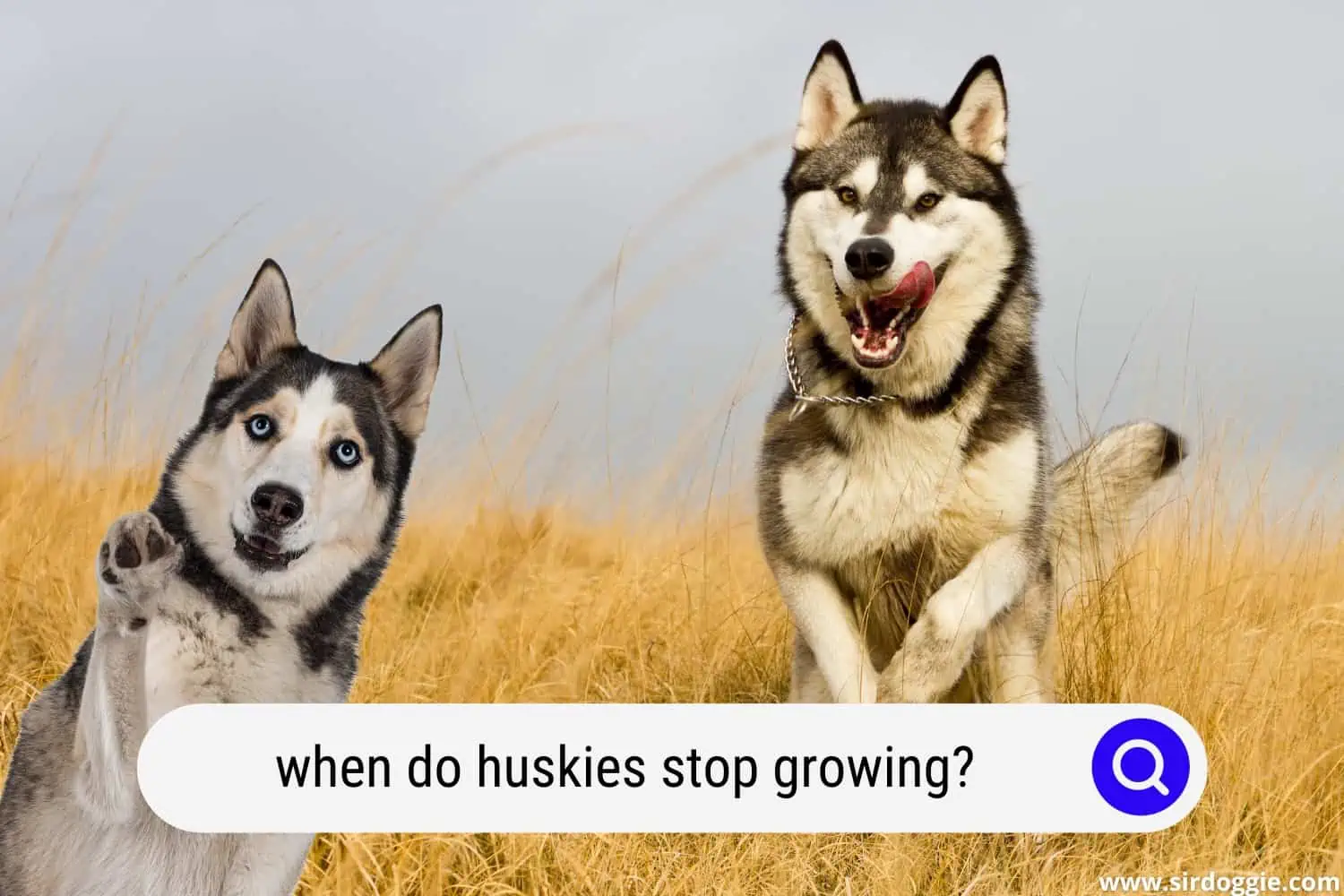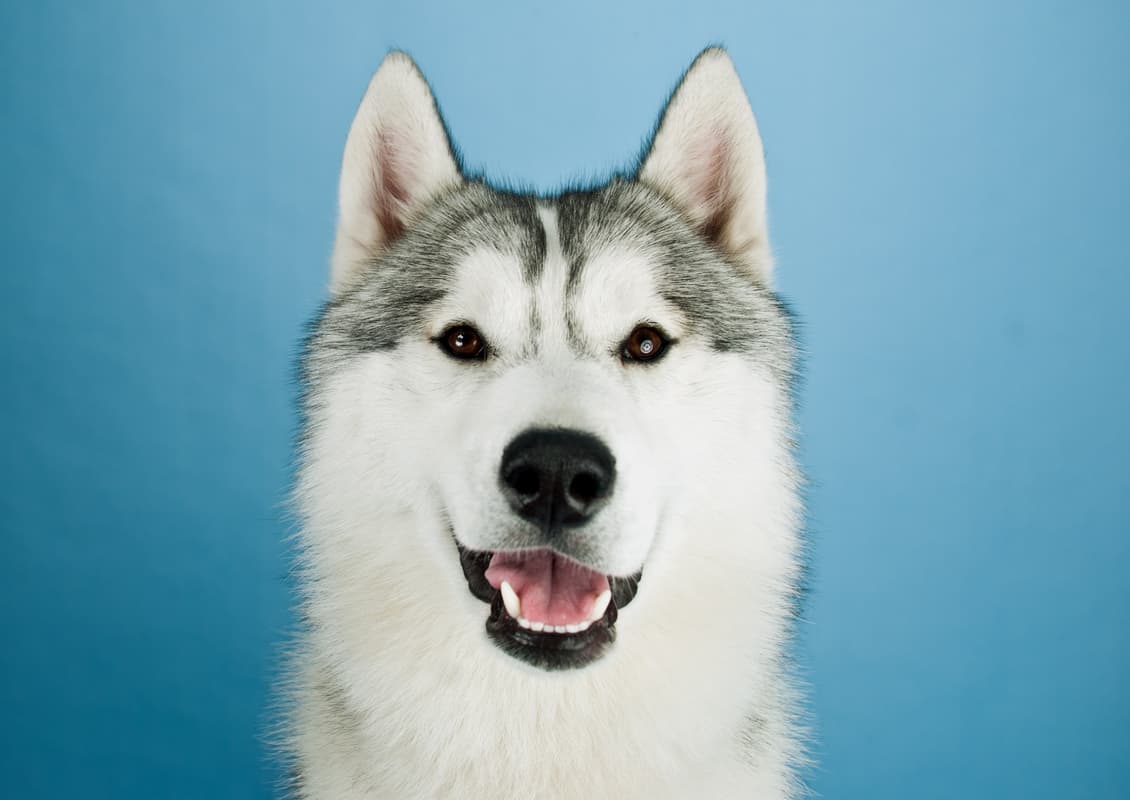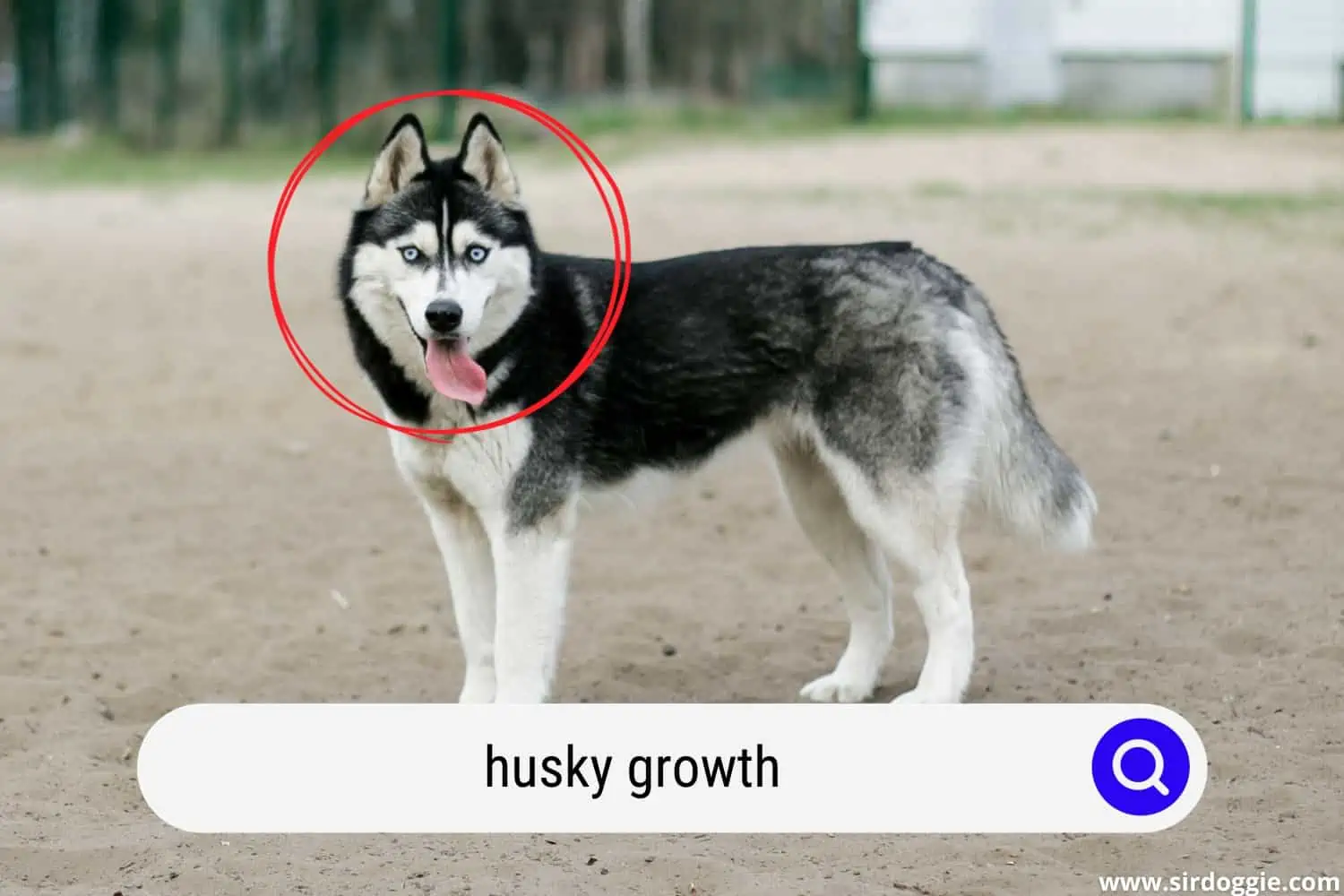When Do Huskies Stop Growing? [ANWERED]
On average, Huskies stop growing in height after about 18 months. However, they will continue to become bigger, stronger, and heavier until they reach the age of three years.

Huskies are high-endurance, energetic, and working dogs. These working dogs have a thick double coat and distinctive color markings.
If you own a Husky puppy, you might be amazed at how quickly they grow.
During the first three years, Huskies go through many physical and mental transformations. Proper nutrition and exercise play an important role in this stage of development, however.
For more details and a breakdown of Husky sizes throughout their lifespan keep reading. We also share some tips to help your Husky stay healthy and strong throughout their life.
Related Reading: Tips For Training Your Husky For Better Behaviour
How Big Is A Fully Grown Husky?
The Huskies are medium-sized dogs with compact bodies. Husky males are bulkier and taller than their female counterparts.
Let’s have a look at Husky’s average height and weight.
- Average Height:
- Males: 53 – 60 cm
- Females: 51 – 56 cm
- Average Weight:
- Males: 20 – 27 kg
- Females: 16 – 22½ kg

How long does it take for a Husky to be fully grown?
Huskies go through distinct developmental periods just like other dogs do. The first few months of a Husky’s life are a time of rapid development.
However, Huskies continue to grow and develop much longer than many other dog breeds.
Both male and female Husky will reach a full height at about 18 months. They still have some weight to gain before they have reached their adult bulk. The Husky continues to develop muscles and gain healthy bulk up to the age of about 3 years.
Remember that these are averages and may vary slightly. Female Huskies don’t get as bulky as males. They usually reach full adult weight at about 2 years. But the genders of Huskies are prone to shedding substantially at least twice a year.
Pro Tip: The best way to determine how big the Husky will get is to take a look at their parents.
What age do Huskies calm down?
The temperament and personality of each Husky may vary. This makes it tough to define a set age when your Husky will calm down.
Huskies were bred as working dogs in a harsh climate. They have high energy levels and require plenty of activities, playtime, and exercise. If you don’t give them enough activities, they can have wild temperaments.
Typically, Huskies remain hyperactive for longer which can make Huskies great dogs around kids. Usually, Husky pups are more hyperactive than adult Huskies, just like other breeds.
You might see a slight decrease in energy levels around the 6 to 12-month mark. Most Huskies remain highly energetic and hyperactive well into their 2-year mark, and some Huskies continue to howl regularly.
The best way to calm your hyperactive Husky is to provide proper behavioral training.
You must ensure that your Husky gets the correct amounts of both physical and mental stimulation.
Are Huskies supposed to be skinny?
Many Huskies are on the slim side, and that’s perfectly normal. There are several ways to spot if your Husky is underweight or too skinny:
- If you can see their prominent bones including ribs, spine, and pelvic bones then your Husky needs to gain weight.
- If you notice that there isn’t any fat or muscle on your Husky, it is a severe symptom of being underweight.
- Their coat may look very dull and flat.
If your Husky is underweight or very skinny, the possible reasons could be:
Genes:
If your Husky has always been skinny, it might be due to its genetics.
Diet:
Your Husky might not be getting enough nutrients and there is an issue with its diet.
Picky eater:
If your Husky is a picky eater, then this might be another cause of weight loss.
Exercise:
This dog is highly energetic and needs a lot of exercise daily. Your Husky is skinny because it might not be eating the right amount of calories to match his physical activities.
Ailment:
Your Husky might be skinny due to an illness. If it seems to be sick, the best option would be to take your dog to a vet.
Parasites:
Your Husky may be losing weight because they’re suffering from certain parasites.
Anxiety:
Your Husky might be stressed or anxious which is causing it to lose weight.
How to Help Your Husky Grow?
Ideal Diet for Husky
Diet is a very important point that contributes to the overall health of your Husky. If you want your Huskies to be in good physical condition and full of energy, it is essential to feed them properly.
Pro Tip: How much your Husky eats depends on their size, age, gender, build, metabolism, and activity level.
Huskies were bred to require less food than some similarly sized breeds. Your Husky’s diet should be healthy and include all nutrients. Consider foods rich in proteins as it will help to maintain lean muscle mass.
Fresh, clean water should be available at all times for this active breed. Some huskies have sensitive stomachs and may require specific foods or avoid specific foods.
Exercise for Husky
Getting exercise will help your Husky grow strong. If these dogs are allowed to get bored and are not walked regularly, they can become destructive and start to display behavioral problems.
Since they love to explore and are curious about nature, it’s a good idea to have a flea shampoo for your husky on hand.
Here are some tips to help your Husky gain healthy weight:
- Make sure you are giving them nutritionally complete food
- Add more snacks and treats to their diet
- Feed them smaller meals and more often
- Make sure that your Husky is not stressed
- Feed them a diet that is high in protein and healthy fats
- Include probiotics and plenty of amino acids in their diet
Risks During Husky Growth
The Siberian Husky is an overall healthy dog. However, some conditions may affect them during growth. These health concerns include:
- Your Husky might develop eye problems like Cataracts, Corneal Dystrophy, and Progressive Retinal Atrophy.
- Your Husky might suffer from hormonal imbalances.
- All kinds of parasites, worms, and bugs can invade your Husky’s body, inside and out.
- Huskies are susceptible to bacterial and viral infections like parvo, rabies, and distemper.
- The Husky has a high incidence of hip dysplasia, an inherited cause of hindlimb lameness.
Some Interesting Facts About Husky: Huskies were bred to run for long distances with minimal food supplies! A full-grown Husky howl can be heard from a whopping 10 miles away! Huskies were once war dogs. During World War II, Huskies were used by the US Army to transport provisions, medicine, and mail. Originating in sub-zero climates, Huskies are always ready for severe winter weather. They are among the oldest of the dog breeds and genetically, they are part of the Spitz family.

Final Thoughts
A healthy diet, stress-free environment, and physical and mental stimulation will help your Husky develop and grow in a great way.
Huskies make great pets for families due to their playful and loving nature. The breed is highly energetic and is likely to get bored, if not exercised properly. Continue to learn Are Huskies Good Guard Dogs?
If you liked this article, make sure you check out the rest of the posts on the website.

Family Dog Expert Author
Hi there! I’m Stuart, a devoted dog lover and family dog expert with over a decade of experience working with our furry companions. My passion for dogs drives me to share my knowledge and expertise, helping families build strong, loving bonds with their four-legged friends. When I’m not writing for SirDoggie, you’ll find me hiking, playing with my beautiful dog, or studying music.